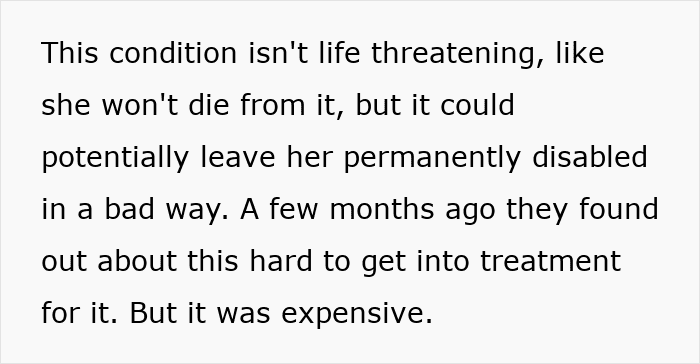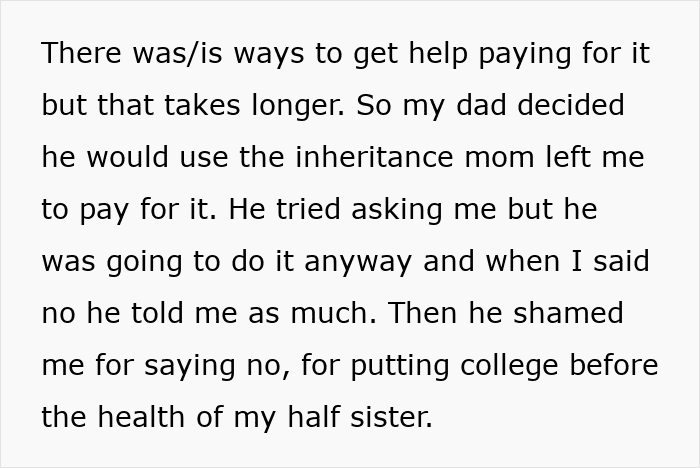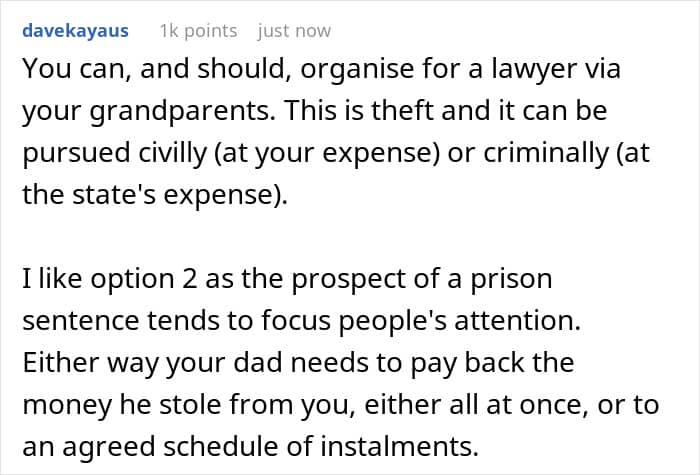Funny how unconditional love can become limited the moment money enters the picture. Suddenly, people start showing their true colors, and you might be dragged into a fight you didn’t pick with a relative who thinks they deserve the world.
Just ask Reddit user PlentyBluejay273 — he knows all about it. When the teenager discovered that his father secretly used the inheritance his late mother left him to pay for his half-sister’s medical treatment, he realized that sometimes, even family is something you have to stand up to.
RELATED:
Money doesn’t just solve problems; it also creates them

Image credits: Arina Krasnikova / Pexels (not the actual photo)
This 16-year-old’s father tried to take the inheritance his late mother had left him









Image credits: Pixabay / Pexels (not the actual photo)
The teen’s half-sister requires expensive treatment for a rare medical condition, and their father wants to use his his inheritance to pay for it



Image credits: Yaroslav Shuraev / Pexels (not the actual photo)

Image credits: PlentyBluejay273
Sadly, this story is indicative of a wider problem
A survey by Irwin Mitchell, a law firm based in the United Kingdom, suggests that fewer than a third of parents over the age of 55 discuss inheritance with their children, and as a result, families risk having fights similar to the one we just read about.
“Too often, people assume their loved ones understand their wishes—but our experience shows that silence can lead to serious consequences. When expectations don’t match reality, families can find themselves in conflict,” says Paula Myers, Irwin Mitchell’s National Head of Will Trust & Estate Disputes.
The survey also found that:
People are generally more likely to discuss inheritance with their mother than their father. For those aged 35-54, 20% speak to their mother, while 13% speak to their father;Divorced individuals are significantly more likely to have discussed inheritance with their children, with 28% of separated or divorced people engaging in these conversations compared to an average of 15%;Widowed individuals are the most likely to discuss inheritance with their children, with 45% having had these discussions;8% expect to receive an inheritance within the next 5 years;4% have been involved in a legal dispute regarding a will, trust, or estate.
“Open, honest conversations are the best way to avoid disputes and ensure that everyone is on the same page [but] according to these results, this isn’t happening, and I think it is likely we will see more disputes,” Myers explains
The lawyer says there is legislation permitting certain individuals—such as spouses, children, or dependants—to legally contest an estate if they believe they have been unfairly excluded or inadequately provided for, but these disputes can be both emotionally and financially taxing.
“The emotional distress caused by these disputes can be profound, leading to strained relationships, heightened tensions, and long-lasting impacts on family dynamics. It is crucial to address these issues proactively to minimise the emotional toll on all involved.”

Image credits: Nathan Cowley / Pexels (not the actual photo)
Psychologists say guilt trips are the ultimate manipulation tool. They’re a way to make someone feel awful about their decisions, even if they are totally justified. And when it’s their family pulling the strings? That’s just a whole new level of emotional warfare. The trick is learning to spot it and not let it get to you.
And our Redditor managed to do that. He set his boundaries, and, honestly, that’s a life skill we should all develop. Learning to say no, especially to family, isn’t easy, but sometimes it’s necessary. At the end of the day, it’s about knowing what you’re worth and standing firm when someone’s trying to make you feel like the bad guy for doing what’s best for you.
Most people who read the story sided with the teen, saying he’s not a jerk for not wanting to give up his future













